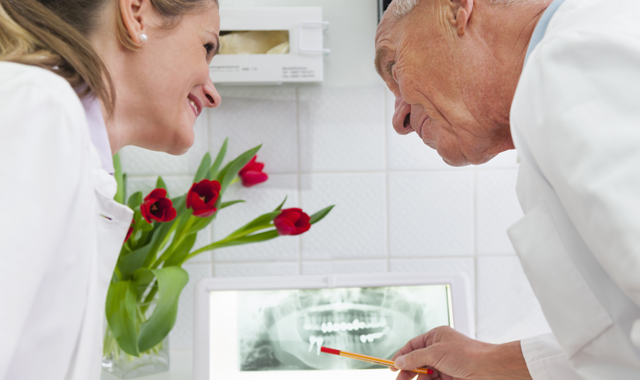How to create valuable partnerships between younger and older dentists
Learning from each other’s expertise and knowledge is key.

The inexperienced dentist may see a wonderful opportunity with a mentor who has experience not just in the clinical side of the profession but also in the administrative part. Knowing management skills and having financial and business expertise is very much a part of the economics of dentistry.
The partnership of the two age groups may be a wonderful relationship for each. The more mature and experienced dentist sees the energy of youth and the ability to work and learn so that the dental practice may grow and be respected by the community that it serves. It is also an excellent built-in exit strategy for the experienced and older dentist. With seminars and the recent state-of-the-art education of the younger dentist, the clinical piece of dentistry can be addressed and the patients should be happy. When the dentists speak to each other, they should certainly understand their professional language and work together to increase production and to learn from each other.
More from the author: How to navigate dental practice transitions
Let’s look at the business side of the relationship to see what the junior dentist may not be aware of and the communication between the two needed to make sure that each dentist’s experience brings the best advice to the practice.
Clinical and administrative skills
With an understanding that each partner may learn and use the other’s clinical skills to enhance the practice, there would typically be a discussion of the high points of each other’s expertise and knowledge. The administrative skills may be the area in which there could be conflict unless the dentist who has not learned about these areas in class or on the job may have to be in a position of trust when a decision must be made. An example is one regarding who to rely on about pricing and terms on a piece of equipment when discussing this with a sales person. The ability to negotiate the price and terms on an asset that both dentists agree upon acquiring may produce additional profits to the practice that the dentist who is lesser experienced in business matters may not understand. Areas in the partnership agreement regarding value and outside service providers as well as responsibilities are other points where the less experienced dentist may need to depend on the more mature dentist.
Questions about the administration and determination of outside service providers
Besides the acquisition price, which must have been agreed upon or there would not have been a partnership agreement, was there a practice valuation to determine a formula by which the price to buyout the interest in the practice could be resolved? How is the compensation determined for the partners/employees? Is there insurance for the partners to assist in the buyout in the event of death or disability? Is there key man insurance for any associate dentists who may be instrumental to the growth of the practice? With each of these questions, who is responsible for the interviewing and analyzing with the sellers of these services? Were interviews arranged for determining the proper CPA firm to be involved with the dental practice? These are but some of the many questions that the inexperienced dentist may learn from even having the queries asked. Other questions are also involved with the administration and ongoing business activity within the dental practice. The fortunes of each dentist are dependent on the economics of the office besides the clinical skills.
Trending article: How to improve your dental practice's economic growth
Learning from the mentor
By joining the practice, the amount of years lost in trial and error from working without a guide will be saved. The young man or woman who partners with an experienced dentist will have received a first-class education while being paid as he or she learns with on-the-job training. Besides the agony of learning while making mistakes on his or her own, the guidance will be from someone with the experience that can not be taught in a classroom. The partnership will work as long as there is humility and knowledge in knowing what one does not know and being able to absorb the lessons at hand. The clinical skills can be honed over the years but administrative know-how is typically learned from being there and making those critical decisions. Of course, the proper outside advisers are key to the success of the venture. Seeing who the experienced dentist retains for advice and listening and learning from those who offer the counsel will make things less arduous for the younger partner.
How Dentists Can Help Patients Navigate Unforeseen Dental Care
December 12th 2024Practices must equip patients with treatment information and discuss potential financing options before unexpected dental treatments become too big of an obstacle and to help them avoid the risk of more costly and invasive procedures in the future.